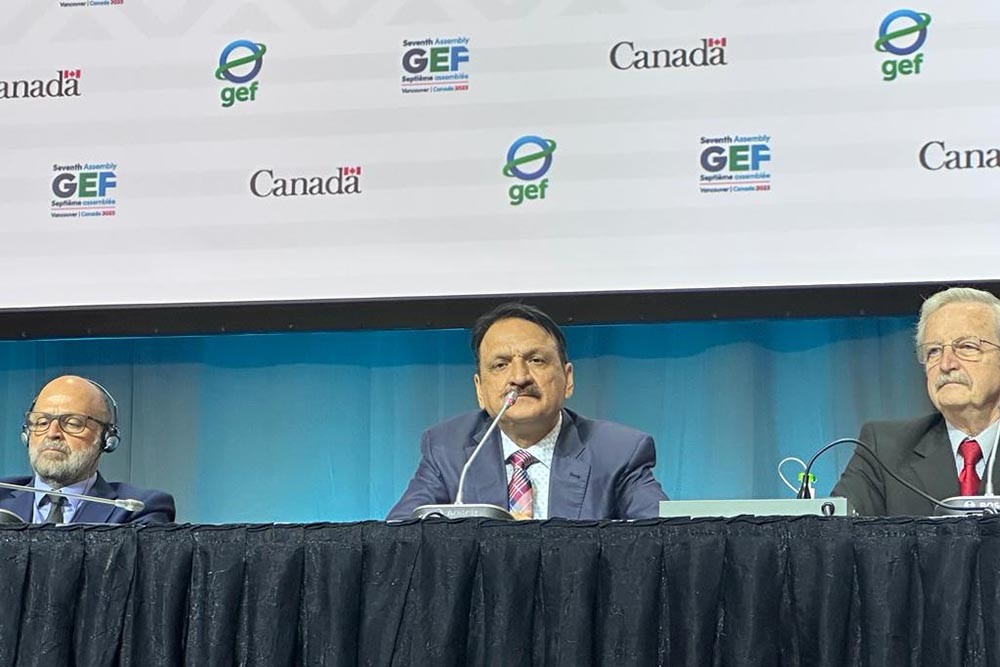
KATHMANDU: Finance Minister Prakash Sharan Mahat has said Nepal has 45% forest coverage out of total land, thereby providing a clean breath of oxygen for humans.
Addressing the seventh assembly of the Global Environment Facility (GEF) in Canada, Minister Mahat reminded the international community that Nepal is the source of water for over one billion people in South Asia. Nepal has been making honest efforts on biodiversity and environment conservation, he said, adding that the wild animals that were on the verge of extinction have been conserved well, resulting in the increase in the population of tigers and rhinos.
Minister Mahat said the forest and wildlife are significant heritage not only for Nepal but also for the world community. Despite these endeavours, Nepal is among the 10 countries most vulnerable to climate change. Erratic weather-triggered catastrophes such as drought, severe rainfall, and landslides have increased in Nepal of late, he said.
The Minister further said Nepal is estimated to have its temperature rise from 0.5 to 2 degree Celsius by 2030 compared to the pre-industrial period, while the country needs some $50 billion to face the loss and damages to be caused by the temperature rise by 2050.
Mahat underscored the need for effective enforcement of the programmes run under climate finance. The Minister also requested that the resources from the New Global Biodiversity Framework Fund (GBFF) passed by the assembly should be mobilised in the most vulnerable countries. Then only the implementation of an integrated and holistic programme will be meaningful, he emphasized.
Meanwhile, Minister Mahat held discussions on bilateral issues with the Chiefs and representatives of various international organisations. During the bilateral meeting with CEO of the Global Environment Facility, Carlos Manuel Rodriguez, the latter appreciated the conservation efforts made by the government of Nepal in the field of biodiversity, environment and wildlife.
Rodriguez lauded Nepal for arranging 79% of total investment in these fields through internal resources. On the occasion, he pledged support from the GEF to handover new technologies for development of green infrastructures and for replacement of plastic and effective garbage management.
Minister Mahat requested the GEF to consider increasing grant assistance to Nepal for climate actions.
Likewise, in the meetings with Chief Conservation Officer of the World Wildlife Fund, Nik Sekhran; Administrator of the UNDP, Achim Steiner; and Acting Director General of International Union for Conservation of Nature (IUCN), Grethel Aguilar, he deliberated on the global impact of climate change and the challenges being faced by Nepal as well as the ways to mitigate the risks.
During the bilateral meetings, Minister Mahat shed light on the environmental conservation efforts of Nepal and the strides made towards it. He shared that forest coverage in Nepal at present stood at around 45%, owing to the successful implementation of community forest concept. Sharing the success stories of Nepal's wildlife and environment conservation efforts, he informed that the number of tigers has nearly tripled and the number of rhinos has nearly doubled in Nepal in the last decade.
On a different note, he emphasized the operation of the UN's Environment Fund and GEF through the national system so as to achieve concrete results and such programmes should bring about positive changes in the living standards of the local communities.
The Minister brought to the fore the increasing cases of human-wildlife conflict in Nepal resulting in huge loss of lives and properties every year. For the protection of wildlife, he urged international organisations to assist in the construction of roads and other infrastructures that are friendly to wildlife movements, risk insurance for those communities affected by human-wildlife conflict and self-employment programmes among others.
He mentioned that Nepal needed additional financial resources for the development of green infrastructures and for skills development and capacity enhancement of the human resources involved in environment and wildlife conservation efforts.
Canadian Prime Minister Justin Trudeau delivered a special address in the closing ceremony of the GEF Assembly where participants included ministers from 83 countries and stakeholders and representatives from 185 countries.

